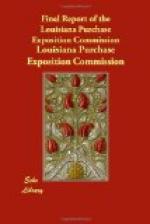God of our fathers, give unto us all that sincerity
of purpose, that rectitude of action so necessary for
the preservation of our rights and privileges.
Make us the toiling means for promulgating for
Thee, and ever more successfully, the divine message
of the Fatherhood of God and the brotherhood of
man, and to Thee, the Father and the Son and the
Holy Ghost, shall be glory now and forevermore.
Amen.
Second. The following is a brief outline of the sentiments expressed by Mr. Thurston, president of the day:
We are here to welcome the
ambassadors, ministers, and
representatives of friendly
foreign nations.
Here we gather to commemorate an event which changed the whole history of America, for the acquisition of the Louisiana Purchase extended the boundaries of the young Republic, which up to that time had no seacoast, except that of the Atlantic Ocean on the east, and gave us a continental domain extending from ocean to ocean.
We come here to celebrate, through this magnificent exposition, the centennial anniversary of the Louisiana Purchase. This is not an exposition of a city or of a State, or even of the United States; it is an exposition of and for the world.
Gentlemen, our visitors and our friends, in this temple of peace, dedicated to the progress of man, your presence is significant of the friendliness to us and toward each other of the nations of the world. May we not hope that in the electric splendor of the twentieth century there will come to all peoples a living exemplification of the words of the Master, “Peace on earth, good will toward men.”
Third. Greeting to the representatives of foreign governments, from the Universal Exposition of 1904, by Hon. David R. Francis, president of the Exposition Company:
The Universal Exposition of
1904 extends a cordial greeting to
the distinguished representatives
of foreign countries who favor
us with their presence on
this memorable occasion.
An assembling of envoys of organized governments, however limited in their number and whatever its object may be, is characteristic of a high civilization; but when that convening is as general in its character as this, it indicates marked progress in the establishment of a better understanding between interests and policies long antagonistic and at variance.
And when the object of such a meeting is, as in this case, to establish and cement friendly relations between people who differ in form of government, in religion, and in race, it means a distinct step toward the organization of a parliament, an accomplishment worthy of highest endeavor, because its consummation would result in universal peace.
When the civilized nations of the earth meet in friendly rivalry, their better acquaintance engenders increased respect. The closer commercial




